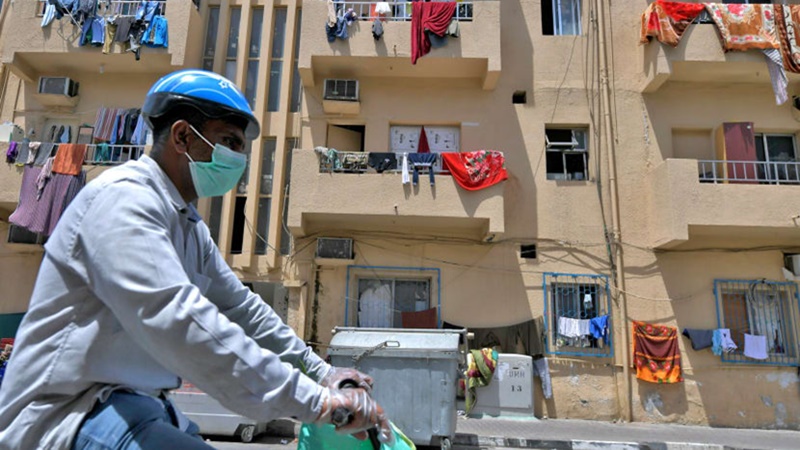DUBAI, United Arab Emirates — The controversy surrounding cheap migrant labor in the oil-rich Gulf states have intensified during the coronavirus pandemic, amid reports of workers going without food and water and being deprived of pay.
Video: CNBC
“A massive issue not being discussed is that some of the (workers) are going home without their paid wages,” Rothna Begum, a senior researcher at Human Rights Watch told CNBC on Thursday. “This is thousands of dollars of wages that are not being paid because unscrupulous employers and agents realize this is an opportunity to allow workers to go home (to their home countries) without having to pay them.”
Migrant workers are also being fired in their thousands. In the UAE alone, for example, more than 50,000 Pakistani workers have been laid off and repatriated, according to Pakistan’s ambassador there. Workers from Pakistan make up 20% of the UAE’s population.
Nationals from India, Bangladesh, the Philippines and Nigeria, among others, also make up the roughly 35 million-strong migrant workforce that’s been crucial to every sector of the GCC economy.
Rights advocacy group Amnesty International said that the coronavirus pandemic had worsened conditions for many of these workers. The group cites salary delays and layoffs as a major risk plaguing the community right now, in addition to overcrowded living conditions, a lack of support, detentions and deportations, and problems with healthcare and sick pay.

Karim Sahib | AFP | Getty Images
Some workers still in the UAE also say they have not been paid. More than a dozen foreign taxi drivers in Dubai, for instance, who spoke to CNBC over the course of 12 weeks, have told CNBC they were not paid during the emirate’s coronavirus lockdown and had to rely on friends and relatives for food and money.
If they tried to protest, the drivers said, their employers threatened to revoke their visas. “They are paying us zero money,” one taxi driver, speaking anonymously out of fear of reprisal, said of his employer in late April. “But what will we do? If we say anything they will cancel our visa, send us back to Pakistan.”
The UAE’s Ministry of Human Resources did not reply to a request for comment. There is no region-wide body that oversees migrant labor.
‘Going home destitute’
Governments need to create mechanisms to ensure that workers are paid before they return to their home countries, Human Rights Watch’s Begum said. So far, none of the GCC states have implemented this.
“Right now we’re not seeing governments come through with that mechanism, so now we’re seeing many of the (workers) going home destitute, potentially going back to debt, or even worse off than when they left the country,” she said.
There also remains the problem of workers trapped in their host countries and unable to return home, with some having become undocumented before the pandemic who now fear arrest if they tried to leave, rights advocates said.
“They’re still finding themselves destitute, they still need access to food, housing and health in particular, a lot of them are not coming forward because they’re scared of authorities catching them as undocumented workers,” Begum added.
She noted some good practices in place, however, including recent decisions by the UAE and Bahraini governments, among others, to extend visas to ensure workers are not becoming undocumented during the pandemic.
Qatar, Saudi Arabia, and the UAE have also said that undocumented workers can still receive healthcare. But the problem remains that many workers are simply too afraid to get care, believing they will be arrested, revealing a “trust deficit” between workers and their host governments, Begum said.
As economies in the Gulf slowly reopen, some workers have hopes that things will get better. One Dubai taxi driver from Egypt, who had not returned home to see his family in more than two years, said that while he misses home, he knows his job prospects aren’t good there. When asked how he managed without pay during Dubai’s several weeks of strict lockdown, he replied: “It’s only thanks to God.”
CNBC / Balkantimes.press
Napomena o autorskim pravima: Dozvoljeno preuzimanje sadržaja isključivo uz navođenje linka prema stranici našeg portala sa koje je sadržaj preuzet. Stavovi izraženi u ovom tekstu autorovi su i ne odražavaju nužno uredničku politiku The Balkantimes Press.
Copyright Notice: It is allowed to download the content only by providing a link to the page of our portal from which the content was downloaded. The views expressed in this text are those of the authors and do not necessarily reflect the editorial policies of The Balkantimes Press.
